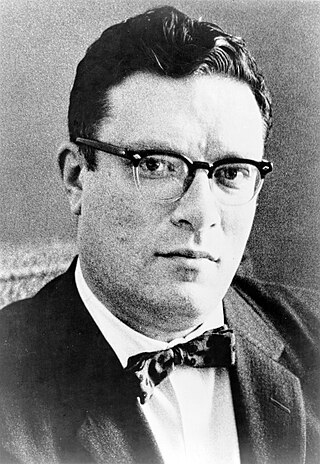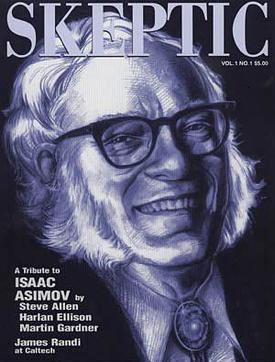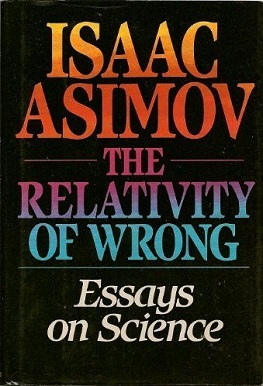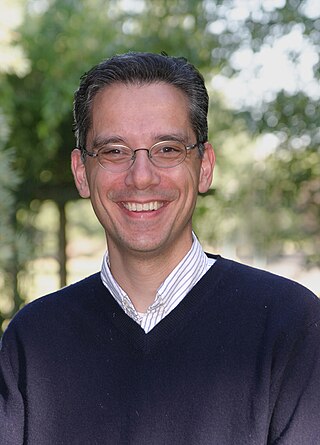Related Research Articles
British science fiction writer Arthur C. Clarke formulated three adages that are known as Clarke's three laws, of which the third law is the best known and most widely cited. They are part of his ideas in his extensive writings about the future.

Isaac Asimov was an American writer and professor of biochemistry at Boston University. During his lifetime, Asimov was considered one of the "Big Three" science fiction writers, along with Robert A. Heinlein and Arthur C. Clarke. A prolific writer, he wrote or edited more than 500 books. He also wrote an estimated 90,000 letters and postcards. Best known for his hard science fiction, Asimov also wrote mysteries and fantasy, as well as popular science and other non-fiction.

The Skeptic's Dictionary is a collection of cross-referenced skeptical essays by Robert Todd Carroll, published on his website skepdic.com and in a printed book. The skepdic.com site was launched in 1994 and the book was published in 2003 with nearly 400 entries. As of January 2011 the website has over 700 entries. A comprehensive single-volume guides to skeptical information on pseudoscientific, paranormal, and occult topics, the bibliography contains some seven hundred references for more detailed information. According to the back cover of the book, the on-line version receives approximately 500,000 hits per month.

Beliefs that the Earth is flat, contrary to over two millennia of scientific consensus that it is spherical, are promoted by a number of organizations and individuals. Such beliefs are pseudoscience; the hypotheses and assertions are not based on scientific knowledge. Flat Earth advocates are classified by experts in philosophy and physics as science deniers.

Spherical Earth or Earth's curvature refers to the approximation of the figure of the Earth as a sphere. The earliest documented mention of the concept dates from around the 5th century BC, when it appears in the writings of Greek philosophers. In the 3rd century BC, Hellenistic astronomy established the roughly spherical shape of Earth as a physical fact and calculated the Earth's circumference. This knowledge was gradually adopted throughout the Old World during Late Antiquity and the Middle Ages. A practical demonstration of Earth's sphericity was achieved by Ferdinand Magellan and Juan Sebastián Elcano's circumnavigation (1519–1522).

Michael Brant Shermer is an American science writer, historian of science, executive director of The Skeptics Society, and founding publisher of Skeptic magazine, a publication focused on investigating pseudoscientific and supernatural claims. The author of over a dozen books, Shermer is known for engaging in debates on pseudoscience and religion in which he emphasizes scientific skepticism.
This is a bibliography of the books written or edited by Isaac Asimov, arranged alphabetically. Asimov was a prolific author, and he engaged in many collaborations with other authors. This list may not yet be complete. The total number of books listed here is over 500. Asimov died in 1992 at age 72; a small number of his books were published posthumously.

"The Last Question" is a science fiction short story by American writer Isaac Asimov. It first appeared in the November 1956 issue of Science Fiction Quarterly and in the anthologies in the collections Nine Tomorrows (1959), The Best of Isaac Asimov (1973), Robot Dreams (1986), The Best Science Fiction of Isaac Asimov (1986), the retrospective Opus 100 (1969), and in Isaac Asimov: The Complete Stories, Vol. 1 (1990). While he also considered it one of his best works, "The Last Question" was Asimov's favorite short story of his own authorship, and is one of a loosely connected series of stories concerning a fictional computer called Multivac. Through successive generations, humanity questions Multivac on the subject of entropy.
The Skeptics Society is a nonprofit, member-supported organization devoted to promoting scientific skepticism and resisting the spread of pseudoscience, superstition, and irrational beliefs. The Skeptics Society was co-founded by Michael Shermer and Pat Linse as a Los Angeles-area skeptical group to replace the defunct Southern California Skeptics. After the success of its Skeptic magazine, introduced in early 1992, it became a national and then international organization. Their stated mission "is the investigation of science and pseudoscience controversies, and the promotion of critical thinking."

Skeptic, colloquially known as Skeptic magazine, is a quarterly science education and science advocacy magazine published internationally by The Skeptics Society, a nonprofit organization devoted to promoting scientific skepticism and resisting the spread of pseudoscience, superstition, and irrational beliefs. First published in 1992, the magazine had a circulation of over 40,000 subscribers in 2000.
Gold: The Final Science Fiction Collection is a 1995 collection of stories and essays by American writer Isaac Asimov. The stories, which comprise the volume's first half, are short pieces which had remained uncollected at the time of the author's death. "Cal" describes a robot that wishes to write, and the title story "Gold" expresses both Asimov's admiration of King Lear and his thoughts on cinema adaptations of his own stories. The story "Gold" won a Hugo Award.
Courtney Brown is an American political scientist and parapsychologist who is an associate professor in the political science department at Emory University. He is known for promoting the use of nonlinear mathematics in social scientific research, and as a proponent of remote viewing, a form of extrasensory perception.
Mesoplanets are planetary-mass objects with sizes smaller than Mercury but larger than Ceres. The term was coined by Isaac Asimov. Assuming size is defined in relation to equatorial radius, mesoplanets should be approximately 500 km to 2,500 km in radius.

The Relativity of Wrong is a 1988 collection of seventeen essays on science by American writer and scientist Isaac Asimov. The book explores and contrasts the viewpoint that "all theories are proven wrong in time", arguing that there exist degrees of wrongness.
Prometheus Books is a publishing company founded in August 1969 by the philosopher Paul Kurtz. The publisher's name was derived from Prometheus, the Titan from Greek mythology who stole fire from Zeus and gave it to man. This act is often used as a metaphor for bringing knowledge or enlightenment.

Flim-Flam! Psychics, ESP, Unicorns, and Other Delusions is a 1980 book by magician and skeptic James Randi about paranormal, occult, and pseudoscience claims. The foreword is by science fiction author Isaac Asimov. Randi explores topics which he says that scientists and the media are too willing to promote without skepticism and proper expertise.

Lee Cameron McIntyre is an American author, researcher, and academic. He is a research fellow at the Center for Philosophy and History of Science at Boston University and an instructor in ethics at Harvard Extension School. He has published numerous nonfiction book and articles on the philosophy of the social sciences and attempts to undermine science. In 2023, he became a fellow with the Committee for Skeptical Inquiry.
Robert J. (Bob) Schadewald was an author, researcher, and former president of the National Center for Science Education (NCSE). An internationally recognized expert on pseudoscience, Schadewald penned numerous articles on creationism, perpetual motion, flat earthism, and other pseudoscience for such magazines as Science 80, Technology Illustrated, Smithsonian, and Science Digest.
In a writing career spanning 53 years (1939–1992), science fiction and popular science author Isaac Asimov (1920–1992) wrote and published 40 novels, 383 short stories, over 280 non-fiction books, and edited about 147 others.
Depending on the counting convention used, and including all titles, charts, and edited collections, there may be currently over 500 books in Isaac Asimov's bibliography—as well as his individual short stories, individual essays, and criticism. For his 100th, 200th, and 300th books, Asimov published Opus 100 (1969), Opus 200 (1979), and Opus 300 (1984), celebrating his writing.
References
- 1 2 Shermer M (November 2006). "Wronger Than Wrong". Scientific American. 295 (5): 40. Bibcode:2006SciAm.295e..40S. doi:10.1038/scientificamerican1106-40.
- ↑ Asimov, Isaac. The Relativity of Wrong. ISBN 1-55817-169-X (paperback, 1989); ISBN 1-57566-008-3 (paperback reissue, 1996).
- ↑ Asimov Isaac (Fall 1989). "Wronger Than Wrong". The Skeptical Inquirer. 14 (1).
- ↑ "Welcome to Jenkins' Spoiler-Laden Guide to Isaac Asimov's The Relativity of Wrong". 26 February 2006.